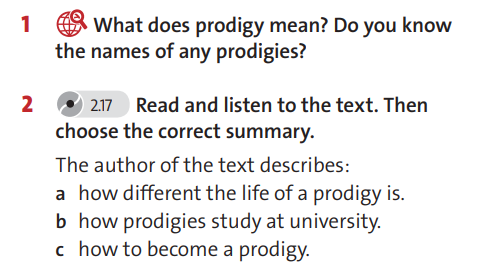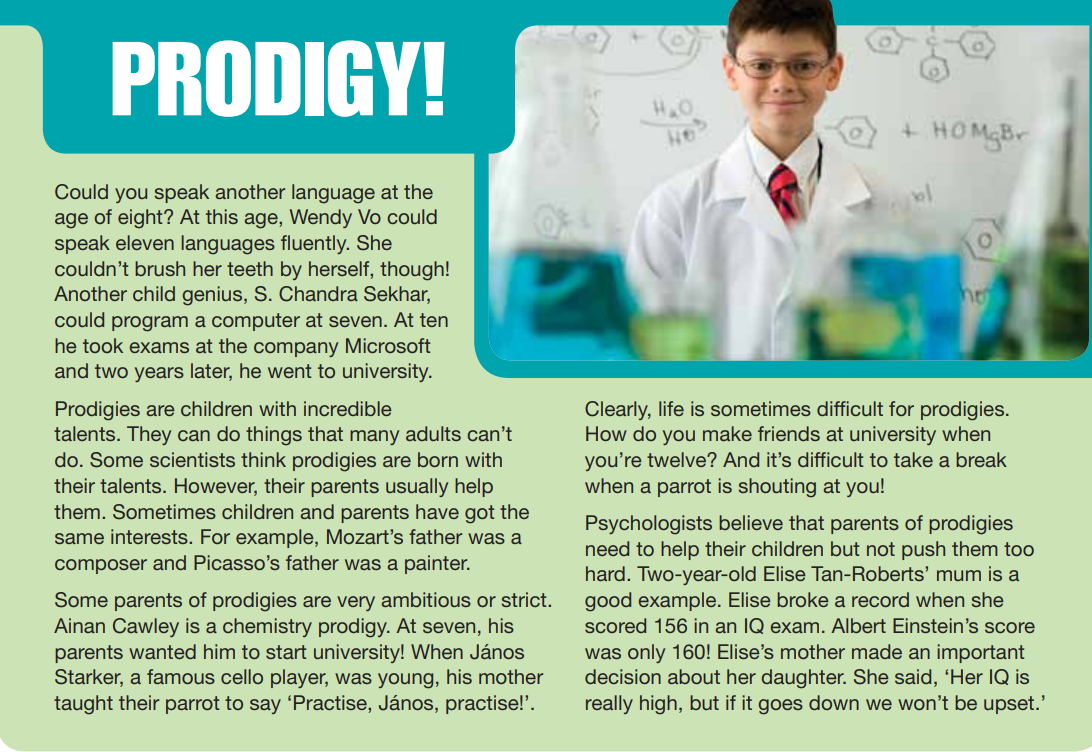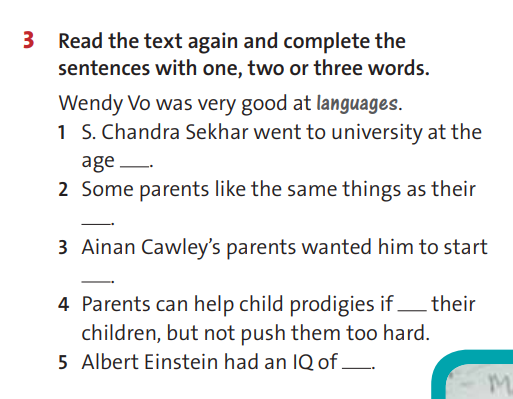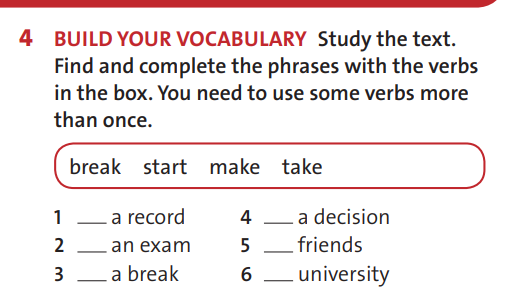
|
Unit 5. Entertainment and Media |
School: |
|||||
|
Date: |
Teacher’s name: |
|||||
|
Grade 7 __ |
Number present: |
Number absent: |
||||
|
Theme of the lesson: |
Whizz-kids |
|||||
|
Learning objectives(s) that this lesson is contributing to |
7.UE1 begin to use basic abstract nouns and compound nouns and noun phrases describing times and location on a growing range of familiar general and curricular topics 7.C3 respect differing points of view 7.C4 evaluate and respond constructively to feedback from others 7.L1 understand longer sequences of supported classroom instructions 7.R2 understand independently specific information and detail in short, simple texts on a limited range of general and curricular topics 7.W1 plan, write, edit and proofread work at text level with some support on a growing range of general and curricular topics |
|||||
|
Lesson objectives |
All learners will be able to: |
|||||
|
Pupils can read and knows new words. |
||||||
|
Most learners will be able to: |
||||||
|
- understand and listen about a text and can answer the questions |
||||||
|
Some learners will be able to: |
||||||
|
ask and answer interview questions; -can make sentences understand and know about child prodigies |
||||||
|
Language objective |
Specific vocabulary and grammar points related to the topic. |
|||||
|
Value links |
Respect, cooperation, functional literacy |
|||||
|
Cross curricular links |
Social, personal Education, ICT |
|||||
|
Previous learning |
Students have studied about Directions |
|||||
|
Use of ICT |
Acquisition of ICT specific vocabulary |
|||||
|
Intercultural awareness |
Preferences in using different types of technology by teenagers in Kazakhstan and western countries |
|||||
|
Kazakh culture |
Investigation of using new technologies in Kazakhstan. |
|||||
|
Pastoral Care |
Assure you met all learners’ needs |
|||||
|
Health and Safety |
Make sure power cords are not a tripping hazard Everyday classroom precautions |
|||||
|
Planned timings |
Planned activities |
Resources |
||||
|
10 minutes |
Ex1 What does prodigy mean? Do you know the names of any prodigies? Ex2. 2.17. Read and listen to the text. Then choose the correct summary The author of the text describes: How different the life of a prodigy is.
|
|||||
|
Main part 5 min. 7 min 10 min |
Ex3. Read the text again and complete the sentences with one, two or three words. Wendy Vo was very good at languages. 1. S. Chandra Sekhar went to university at the age of twelve. 2. Some parents like the same things as their children. 3. Ainan Cawley’s parents wanted him to star t university at seven. 4. Parents can help child prodigies if they help their children, but not push them to hard. 5. Albert Enstein had an IQ of 160.
Ex4. Build your vocabulary. Study the text. Find and complete the phrases with the verbs in the box. You need to use some verbs more than once. 1. break a record 4. Make a decision 2. take an exam 5. Make friends 3. take a break 6. Start university
Work in group:Additional task.Divide students into groups. Puzzle work. Put the sentence in the correct order. Working with phrases from exercise 4 1.It's easy to make friends, but it's hard to keep friendships. 2.My classmates and I will take a break after exams. 3.It's hard for me to make a decision before the election of the series. |
Worksheet |
||||
|
6 min. 4 min 3 min |
Individual task for assessment. Task true or falls from the text. 1.Chandra Sekhar couldn't brush her teeth herself. F 2.Ainan's parents wanted her to go to university at the age of seven. Т 3.Prodigies can do things that many adults can't. T 4.Psychologists believe that parents need to push on children.F 5. Elise broke the record in the exam.T Reflection Learners write : What did you learn today? What parts of the lesson were easy? What parts of the lesson were difficult? Hometask |
|
||||
|
Additional information |
||||||
|
Differentiation – how do you plan to give more support? How do you plan to challenge the more able learners |
Assessment – how are you planning to check learners’ learning? |
Critical thinking |
||||
|
More support: Provide less able learners with some reference grammar material with formulas and examples. More able learners: Make analysis of their work and help weaker ones to help with the right explanation of answers. |
Self-assessment worksheet Observe learners when participating in discussion. Did each learner contribute to the discussion? If not, why not? Learners managed to understand the rules and do the tasks. |
Critical thinking on this lesson lies in understanding grammar point of these rules in English language and it is based on clarity, accuracy, precision, depth, breadth, and fairness. |
||||
|
Summary evaluation What two things went really well (consider both teaching and learning)? 1: 2: What two things would have improved the lesson (consider both teaching and learning)? 1: 2: What have I learned from the lesson about this class or individuals that will inform my next lesson? |
||||||
жүктеу мүмкіндігіне ие боласыз
Бұл материал сайт қолданушысы жариялаған. Материалдың ішінде жазылған барлық ақпаратқа жауапкершілікті жариялаған қолданушы жауап береді. Ұстаз тілегі тек ақпаратты таратуға қолдау көрсетеді. Егер материал сіздің авторлық құқығыңызды бұзған болса немесе басқа да себептермен сайттан өшіру керек деп ойласаңыз осында жазыңыз
Grade 7 , Unit 5 : Whizz-kids , Lesson plan
Grade 7 , Unit 5 : Whizz-kids , Lesson plan
|
Unit 5. Entertainment and Media |
School: |
|||||
|
Date: |
Teacher’s name: |
|||||
|
Grade 7 __ |
Number present: |
Number absent: |
||||
|
Theme of the lesson: |
Whizz-kids |
|||||
|
Learning objectives(s) that this lesson is contributing to |
7.UE1 begin to use basic abstract nouns and compound nouns and noun phrases describing times and location on a growing range of familiar general and curricular topics 7.C3 respect differing points of view 7.C4 evaluate and respond constructively to feedback from others 7.L1 understand longer sequences of supported classroom instructions 7.R2 understand independently specific information and detail in short, simple texts on a limited range of general and curricular topics 7.W1 plan, write, edit and proofread work at text level with some support on a growing range of general and curricular topics |
|||||
|
Lesson objectives |
All learners will be able to: |
|||||
|
Pupils can read and knows new words. |
||||||
|
Most learners will be able to: |
||||||
|
- understand and listen about a text and can answer the questions |
||||||
|
Some learners will be able to: |
||||||
|
ask and answer interview questions; -can make sentences understand and know about child prodigies |
||||||
|
Language objective |
Specific vocabulary and grammar points related to the topic. |
|||||
|
Value links |
Respect, cooperation, functional literacy |
|||||
|
Cross curricular links |
Social, personal Education, ICT |
|||||
|
Previous learning |
Students have studied about Directions |
|||||
|
Use of ICT |
Acquisition of ICT specific vocabulary |
|||||
|
Intercultural awareness |
Preferences in using different types of technology by teenagers in Kazakhstan and western countries |
|||||
|
Kazakh culture |
Investigation of using new technologies in Kazakhstan. |
|||||
|
Pastoral Care |
Assure you met all learners’ needs |
|||||
|
Health and Safety |
Make sure power cords are not a tripping hazard Everyday classroom precautions |
|||||
|
Planned timings |
Planned activities |
Resources |
||||
|
10 minutes |
Ex1 What does prodigy mean? Do you know the names of any prodigies? Ex2. 2.17. Read and listen to the text. Then choose the correct summary The author of the text describes: How different the life of a prodigy is.
|
|||||
|
Main part 5 min. 7 min 10 min |
Ex3. Read the text again and complete the sentences with one, two or three words. Wendy Vo was very good at languages. 1. S. Chandra Sekhar went to university at the age of twelve. 2. Some parents like the same things as their children. 3. Ainan Cawley’s parents wanted him to star t university at seven. 4. Parents can help child prodigies if they help their children, but not push them to hard. 5. Albert Enstein had an IQ of 160.
Ex4. Build your vocabulary. Study the text. Find and complete the phrases with the verbs in the box. You need to use some verbs more than once. 1. break a record 4. Make a decision 2. take an exam 5. Make friends 3. take a break 6. Start university
Work in group:Additional task.Divide students into groups. Puzzle work. Put the sentence in the correct order. Working with phrases from exercise 4 1.It's easy to make friends, but it's hard to keep friendships. 2.My classmates and I will take a break after exams. 3.It's hard for me to make a decision before the election of the series. |
Worksheet |
||||
|
6 min. 4 min 3 min |
Individual task for assessment. Task true or falls from the text. 1.Chandra Sekhar couldn't brush her teeth herself. F 2.Ainan's parents wanted her to go to university at the age of seven. Т 3.Prodigies can do things that many adults can't. T 4.Psychologists believe that parents need to push on children.F 5. Elise broke the record in the exam.T Reflection Learners write : What did you learn today? What parts of the lesson were easy? What parts of the lesson were difficult? Hometask |
|
||||
|
Additional information |
||||||
|
Differentiation – how do you plan to give more support? How do you plan to challenge the more able learners |
Assessment – how are you planning to check learners’ learning? |
Critical thinking |
||||
|
More support: Provide less able learners with some reference grammar material with formulas and examples. More able learners: Make analysis of their work and help weaker ones to help with the right explanation of answers. |
Self-assessment worksheet Observe learners when participating in discussion. Did each learner contribute to the discussion? If not, why not? Learners managed to understand the rules and do the tasks. |
Critical thinking on this lesson lies in understanding grammar point of these rules in English language and it is based on clarity, accuracy, precision, depth, breadth, and fairness. |
||||
|
Summary evaluation What two things went really well (consider both teaching and learning)? 1: 2: What two things would have improved the lesson (consider both teaching and learning)? 1: 2: What have I learned from the lesson about this class or individuals that will inform my next lesson? |
||||||

шағым қалдыра аласыз



















